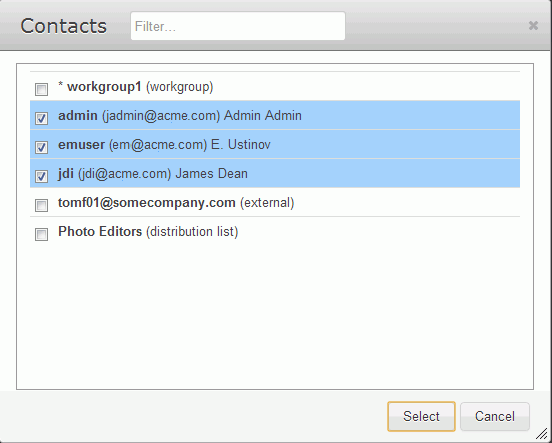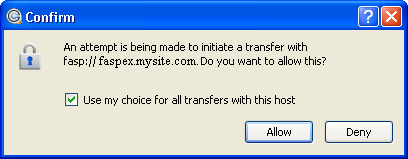Send file packages using Aspera® Faspex™.
To send file packages, go to New Package from the Aspera Faspex menu.

Depending on your Aspera Faspex server configuration, your New Package screen may vary. All potential options in the New Package form are listed below:
| Option | Description |
|---|---|
| To | Enter the package recipients on the To line. A recipient can be a Faspex account name, the email address of an external user (if this is permitted for your account), a workgroup name (workgroup names begin with an asterisk (*)), or a name of a distribution list 
To view your contact list, click the  |
| To (private) | You can send package as a BCC (blind carbon-copy) to other users by
entering Aspera Faspex account names, external email addresses (if allowed), or
distribution lists in this field. To hide this field, click the Hide
Private Recipients link.
 |
| CC (upload/download) | You can notify others when packages are uploaded and/or downloaded by
enabling these fields and entering Aspera Faspex account names or email
addresses. cannot enter workgroups or distribution lists in this field. To hide
this field, click Hide CC. You can configure the CC
notifications by going to .
 |
| Title | The package title (required). |
| (Custom Metadata) | Aspera Faspex allows the administrator to add custom metadata fields in the New Package form. you may see additional text input or options. The information will be added at the beginning of Note. |
| Note | Optional comments about the package. |
| Use encryption-at-rest | If allowed by the system administrator, enable (check) the box if you would like to encrypt the package's contents on the server. Note that the recipient(s) will be required to decrypt the package with a password. |
| Source | If your Aspera Faspex Server is enabled to access content from multiple
file servers, then you can select your content source from the drop-down list.
For example, you may have the option to select whether a package is created from
files on your local computer, from files on another computer, or from
cloud-based storage.
Important:
Outside submitters will not be able to create packages from remote sources. |
| Expiration | If the user is allowed to set package expiration rules, this field will
offer three options:
|
| Contents | Click Browse and select files or folders to send. You can also drag-and-drop files onto the graphic. Note that the drag-and-drop graphic and capability is only available for local uploads and will not be available when uploading from a remote source. |
All standard fields, except Note, are required. Metadata fields may be required, if enabled by the administrator.
When a local transfer is initiated, Aspera Faspex will prompt Aspera Connect™ to start a session. Remote transfers (if enabled) will not prompt Aspera Connect. When the Confirm window appears, click Allow to begin.

Depending on your Aspera Faspex server's setting, the file package you sent are stored on the server for certain days, or until deleted manually. You can find your sent packages in Sent from the Aspera Faspex menu.

On the Sent page, you can shorten the list by moving packages into the archive. Click the Archive button in a row to move the package into the archive. To locate archived packages, click View Full History.